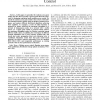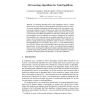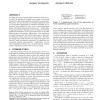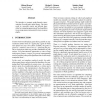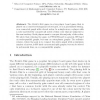533 search results - page 23 / 107 » Playing games with approximation algorithms |
JSAC
2008
13 years 9 months ago
2008
In this paper, we generalize the random access game model, and show that it provides a general game-theoretic framework for designing contention based medium access control. We ext...
SAGT
2010
Springer
13 years 7 months ago
2010
Springer
Can learning algorithms find a Nash equilibrium? This is a natural question for several reasons. Learning algorithms resemble the behavior of players in many naturally arising gam...
ATAL
2008
Springer
13 years 11 months ago
2008
Springer
We define the class of games called simulation-based games, in which the payoffs are available as an output of an oracle (simulator), rather than specified analytically or using a...
UAI
2001
13 years 10 months ago
2001
We introduce a compact graph-theoretic representation for multi-party game theory. Our main result is a provably correct and efficient algorithm for computing approximate Nash equ...
FUN
2010
Springer
14 years 1 months ago
2010
Springer
The Honey-Bee game is a two-player board game that is played on a connected hexagonal colored grid, or in a generalized setting, on a connected graph with colored nodes. In a singl...
